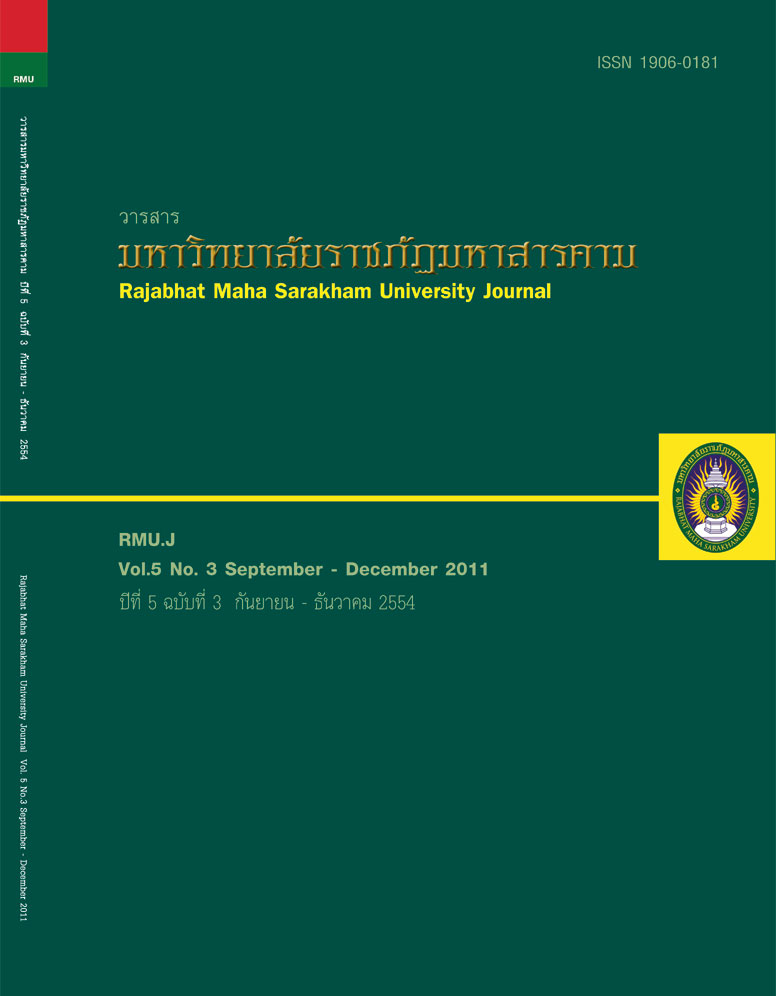ผลลัพธ์ของนโยบายการจัดการนํ้าเพื่อการเกษตรพื้นที่ลุ่มนํ้าชี ในภาคตะวันออกเฉียงเหนือของประเทศไทย; The Outcomes of Water Management Policy for Agriculture on Chi River Basin in the Northeastern Part of Thailand
Main Article Content
บทคัดย่อ
วัตถุประสงค์ของการวิจัยเพื่อศึกษาปัจจัยเหตุ ด้านนโยบายการจัดการนํ้า การนำนโยบายไปปฏิบัติ การประเมินนโยบาย และ
ปัจจัยด้านผลลัพธ์ของนโยบายการจัดการนํ้าเพื่อการเกษตรพื้นที่ลุ่มนํ้าชีในภาคตะวันออกเฉียงเหนือของประเทศไทย บุคลากรเป้าหมาย
หลักในการสัมภาษณ์ครั้งนี้ เป็นการสัมภาษณ์ตัวต่อตัว ต่อนักบริหารระดับสูงในจังหวัดและคณะกรรมการลุ่มนํ้าชี จำนวน 12 คน
เจ้าหน้าที่รับผิดชอบและเจ้าหน้าที่ระดับสูงในอำเภอ จำนวน 24 คน และผู้นำท้องถิ่นและเกษตรกร จำนวน 72 คน ในท้องที่จังหวัด
ชัยภูมิ จังหวัดขอนแก่น และจังหวัดร้อยเอ็ดระหว่างเดือน มิถุนายน 2552 ถึง กุมภาพันธ์ 2553 โดยใช้วิธีการวิจัยแบบ Mixed model
(การวิจัยเชิงคุณภาพและการวิจัยเชิงปริมาณ) ผลการวิจัยพบว่า
1. นักบริหารระดับสูงในจังหวัดและคณะกรรมการลุ่มนํ้าชีเข้าใจและรับรู้เกี่ยวกับนโยบายดังกล่าวในระดับมาก และจำเป็นจะ
ต้องนำนโยบายสู่การปฏิบัติ และขณะเดียวกันเจ้าหน้าที่รับผิดชอบและเจ้าหน้าที่ระดับสูงในอำเภอ จำนวน 24 คน ได้ยอมรับถึงความ
สำเร็จในการนำนโยบายการจัดการนํ้าเพื่อการเกษตรพื้นที่ลุ่มนํ้าชีในภาคตะวันออกเฉียงเหนือของประเทศไทยไปปฏิบัติในพื้นที่ที่ศึกษา
ในระดับมาก ซึ่งมีค่าเท่ากับ ระดับ 3 โดยใช้ระดับในการวัดความคิดเห็น 4 ระดับ คือ 4, 3, 2, 1
2. ในขณะเดียวกันผู้นำท้องถิ่นและเกษตรกรมีความเข้าใจและรับรู้ถึงวัตถุประสงค์ของนโยบายดังต่อไปนี้ คือ จำนวน 3 คน หรือ
4.17% เห็นด้วยกับการนำนโยบายไปปฏิบัติมากที่สุด สำหรับจำนวน 36 คน หรือ 50% เห็นด้วยในระดับมาก และจำนวน 33 คน หรือ
45.83% เห็นด้วยในระดับน้อย
3. ในกรณีของการมีส่วนร่วมของผู้นำท้องถิ่นและเกษตรกร จำนวน 30 คน หรือ 41.67% เห็นด้วยในระดับมาก ส่วนจำนวน 33
คน หรือ 45.83% เห็นด้วยในระดับน้อย และจำนวน 9 คน หรือ 12.50% เห็นด้วยน้อยที่สุด
4. ความเห็นเกี่ยวกับความพึงพอใจของผู้นำท้องถิ่นและเกษตรกรได้แสดงให้เห็นว่า จำนวน 14 คน หรือ 19.44% ชอบนโยบาย
การจัดการนํ้า มากที่สุด จำนวน 47 คน หรือ 65.28% ชอบในระดับมาก และจำนวน 11 คน หรือ 15.28% ชอบในระดับน้อย;
The objectives of this research were to study the outcomes of water management policy, policy
implementation, policy assessment and policy outcomes of water management for agriculture on Chi River
Basin in the northeastern part of Thailand. The samples used were 12 key informants: one on one in-dept
interview who were chief executives from the provinces and committees of the Chi River Basin, 24 chief district
officers, and 72 village leaders and farmers in Chaiyaphum province, Khon Kaen province and Roi-et province
between June of 2009 to February of 2010. The mixed model methodology (quantitative and qualitative
Approach) was used as a research model.
The findings were as follows: 1) The chief executives from the provinces and committees of the Chi River
Basin understood and were aware of the policy at a high level, perceiving the need for policy implementation
while the 24 chief district officers accepted the achievement of water management policy at a high level
measured by at the 3 level from the 4, 3, 2, 1 level of rating scale. 2) The 72 village leaders and farmers in
such areas understood and were aware of the policy objectives: three of samples (4.17%) were very strongly
agree, thirty-six (50%) were agree, and thirty three (45.83%) were slightly agree with policy implementation.
3) The 72 village leaders and farmers in such areas assessed the participation of people: thirty subjects
(41.67%) were rated at a high level, thirty-three (45.83%) were at a low level, and nine (12.50%) were at the
lowest level. 4) Samples showed the following levels of satisfaction with the water management policy: fourteen
chief executives and committees (19.40%) were rated at the high level, forty-seven (65.28%) were at a high
level, only eleven (15.28%) were at a low level with the water management policy.
Article Details
1. บทความที่ลงตีพิมพ์ทุกเรื่องได้รับการตรวจทางวิชาการโดยผู้ประเมินอิสระ ผู้ทรงคุณวุฒิ (Peer Review) สาขาที่เกี่ยวข้อง อย่างน้อย 3 ท่าน ในรูปแบบ Double blind review
2. ข้อคิดเห็นใด ๆ ของบทความที่ลงตีพิมพ์ในวารสารมหาวิทยาลัยราชภัฏมหาสารคาม นี้เป็นของผู้เขียน คณะผู้จัดทำวารสารไม่จำเป็นต้องเห็นด้วย
3. กองบรรณาธิการวารสารมหาวิทยาลัยราชภัฏมหาสารคาม ไม่สงวนสิทธิ์การคัดลอกแต่ให้อ้างอิงแสดงที่มา


